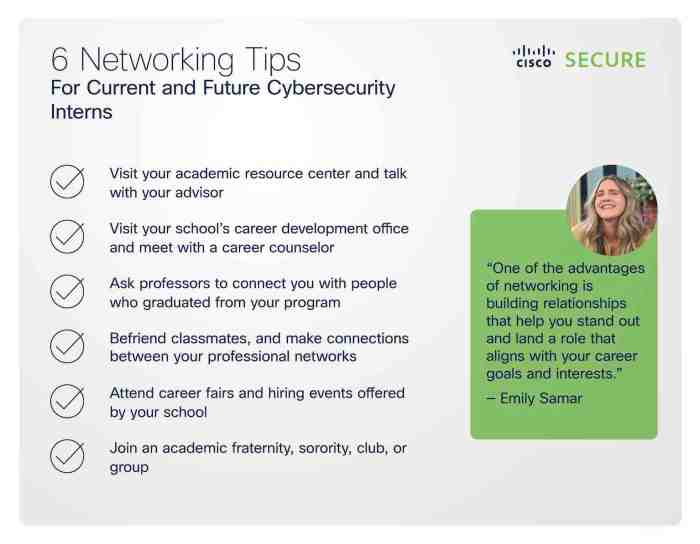Kicking off with Networking Tips for Professionals, this opening paragraph is designed to captivate and engage the readers, setting the tone for a hip high school vibe that resonates with each word. Whether you’re a seasoned professional or just starting out, mastering the art of networking is essential for success in today’s competitive world.
In this guide, we’ll dive into the importance of networking, strategies for building a strong professional network, effective communication tips, leveraging social media, and making the most out of networking events. Get ready to level up your networking game!
Importance of Networking for Professionals: Networking Tips For Professionals

Networking is a crucial element for professional growth as it allows individuals to connect with others in their field, share knowledge, and create opportunities for career advancement. Building a strong network can lead to new job opportunities, mentorship, collaborations, and valuable insights into industry trends.
Benefits of Networking
- Access to job opportunities: Networking can help professionals learn about job openings that may not be advertised publicly.
- Mentorship and guidance: Connecting with experienced professionals can provide valuable advice and insights to help navigate career challenges.
- Collaborations and partnerships: Networking allows professionals to collaborate on projects, share resources, and expand their reach in the industry.
Tips for Expanding Your Professional Network
- Attend industry events and conferences to meet new people and build connections.
- Utilize social media platforms like LinkedIn to connect with professionals in your field and engage in meaningful conversations.
- Join professional organizations and networking groups to expand your network and stay updated on industry trends.
Role of Networking in Career Advancement
Networking plays a significant role in career advancement by providing opportunities for professional development, mentorship, and visibility within the industry. Building a strong network can open doors to new career paths, promotions, and increased job satisfaction.
Building a Strong Professional Network

Building a strong professional network is essential for career growth and opportunities. It involves connecting with a diverse group of individuals who can support, mentor, and collaborate with you in your field.
Strategies for Building a Diverse Professional Network
- Attend industry events and conferences to meet new people and expand your network.
- Join professional organizations related to your field to connect with like-minded individuals.
- Utilize social media platforms like LinkedIn to reach out to professionals in your industry.
- Attend networking mixers and meetups to interact with professionals from different backgrounds.
Key Platforms and Events for Networking Opportunities
- LinkedIn: The go-to platform for professional networking and connecting with industry professionals.
- Industry Conferences: Great place to meet key players in your field and build relationships.
- Local Meetups: Attend local networking events to connect with professionals in your area.
Best Practices for Initiating Conversations and Maintaining Relationships
- Be genuine and show interest in the other person during conversations.
- Follow up after networking events with a personalized message or email to stay connected.
- Offer help and support to your connections when needed to strengthen relationships.
The Importance of Quality and Quantity in Your Network
It’s important to have a balance of quality and quantity in your professional network. While having a large network can provide more opportunities, having strong, meaningful relationships with key individuals can be more impactful in advancing your career.
Effective Communication in Networking
Effective communication plays a crucial role in successful networking interactions. It involves clear and concise verbal exchanges, active listening, and awareness of non-verbal cues to establish strong professional connections.
Importance of Clear Communication
Clear communication is essential in networking as it ensures that messages are accurately conveyed and understood. It helps in building rapport, fostering trust, and creating meaningful relationships with other professionals.
- Avoid using jargon or technical language that may not be familiar to everyone.
- Practice active listening to demonstrate your interest in the conversation and to gather valuable information.
- Ask open-ended questions to encourage dialogue and show genuine curiosity.
- Be mindful of your tone of voice and body language to convey confidence and approachability.
Active Listening During Networking
Active listening is a crucial communication skill in networking that involves fully concentrating, understanding, responding, and remembering what is being said. It shows respect for the speaker and helps in building deeper connections.
- Maintain eye contact and nod occasionally to show your attentiveness.
- Avoid interrupting the speaker and wait for natural pauses to ask relevant questions.
- Reflect on what is being said and paraphrase to confirm your understanding.
- Provide feedback and share your thoughts to contribute meaningfully to the conversation.
Non-Verbal Cues in Networking
Non-verbal cues such as body language, facial expressions, and gestures greatly impact networking success. They can convey confidence, sincerity, and professionalism, enhancing the overall communication experience.
- Smile genuinely to create a welcoming atmosphere and show friendliness.
- Maintain good posture to exhibit confidence and approachability.
- Use appropriate hand gestures to emphasize key points and express enthusiasm.
- Respect personal space and boundaries to demonstrate respect for others.
Examples of Effective Communication Skills
In networking scenarios, effective communication skills can be observed in various ways, such as:
“During a networking event, a professional engages in active listening by asking insightful questions and showing genuine interest in the conversation, leading to a valuable exchange of ideas and contact information.”
“In a business meeting, a professional uses clear and concise language to communicate their ideas, ensuring that all participants understand the key points and objectives discussed.”
“When following up with a new contact, a professional sends a personalized email expressing gratitude for the connection and suggests a potential collaboration opportunity, demonstrating professionalism and proactive communication skills.”
Leveraging Social Media for Networking
Utilizing social media platforms for professional networking is crucial in today’s digital age. It allows professionals to connect with a wider audience, share insights, and build relationships with industry peers. With the right approach, social media can be a powerful tool for expanding your network and advancing your career.
Comparing Social Media Platforms for Networking
- LinkedIn: Known as the professional networking platform, LinkedIn is ideal for connecting with colleagues, industry leaders, and potential employers. It’s a great platform for showcasing your professional experience and expertise.
- Twitter: While Twitter is more informal, it can still be valuable for networking. By engaging in industry chats, sharing relevant content, and interacting with professionals in your field, you can expand your network and stay up-to-date with the latest trends.
- Facebook: Facebook groups can be a valuable resource for networking within specific industries or interest groups. By participating in group discussions and sharing insights, you can establish yourself as a knowledgeable professional in your field.
Dos and Don’ts of Networking on Social Media
- Do: Engage with your connections by commenting on their posts, sharing relevant content, and congratulating them on their achievements.
- Do: Maintain a professional online presence by regularly updating your profile, sharing industry-related articles, and showcasing your expertise.
- Don’t: Overshare personal information or engage in controversial topics that could damage your professional reputation.
- Don’t: Spam your connections with excessive promotional content. Instead, focus on building genuine relationships and adding value to your network.
The Role of Personal Branding in Online Networking
Personal branding plays a crucial role in online networking. By establishing a strong personal brand through your social media profiles, you can attract like-minded professionals, showcase your expertise, and stand out in a crowded digital landscape. Consistency in your messaging, visual identity, and interactions can help you build credibility and trust with your network.
Networking Events and Conferences
Attending networking events and conferences can be extremely beneficial for professionals looking to expand their network, gain insights, and advance their careers. These events provide opportunities to meet like-minded individuals, potential clients, mentors, and even future employers.
Benefits of Attending Networking Events and Conferences
- Expand your professional network
- Gain industry insights and knowledge
- Discover new career opportunities
- Build relationships with key players in your field
Tips for Making the Most out of Networking Events
- Come prepared with business cards and a clear elevator pitch
- Set specific goals for the event, such as connecting with a certain number of people
- Actively listen and show genuine interest in others
- Follow up with new contacts within 48 hours
Strategies for Following Up After Networking Events
- Send a personalized follow-up email expressing your interest in continuing the conversation
- Connect with them on LinkedIn and engage with their content
- Schedule a one-on-one meeting or coffee to further discuss potential collaborations
Experiences of Successful Networking at Conferences, Networking Tips for Professionals
“I attended a conference last year and connected with a speaker who later became my mentor. This relationship has opened up many doors for me in terms of career growth and opportunities.”
“By actively participating in networking sessions at conferences, I was able to secure a new job that I wouldn’t have found through traditional means.”
